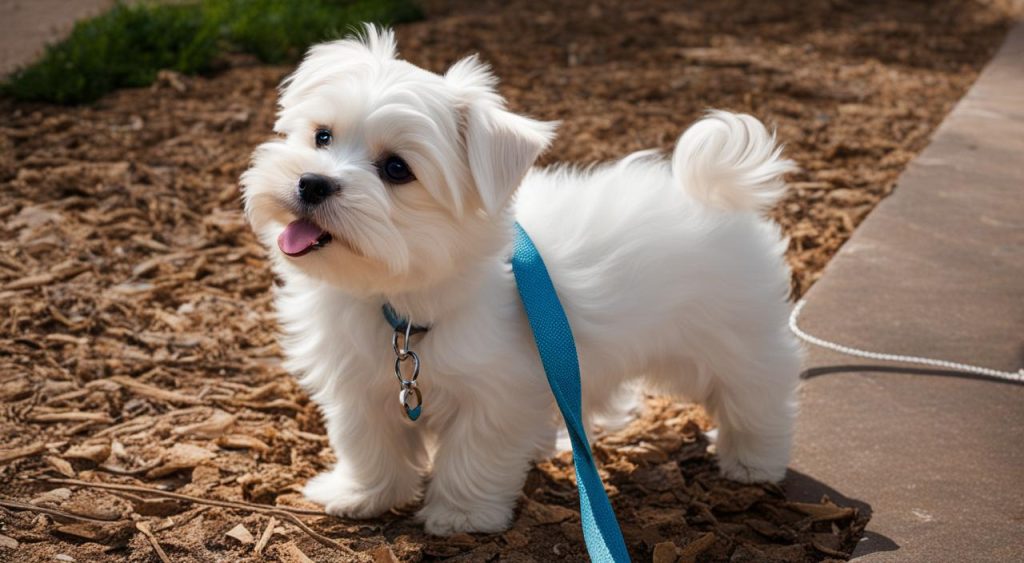If you’re considering adding a Maltese to your family, you may be wondering, “Is a Maltese an easy dog?” The answer comes down to a few key factors, including their temperament, training needs, and overall care requirements. Let’s take a closer look at what makes the Maltese breed unique and whether they are the right fit for you.
Key Takeaways:
- The Maltese breed is known for its bright, sweet, and gentle temperament.
- They are generally easy to train, sensitive, and responsive to positive reinforcement.
- Maintaining their beautiful white coat requires regular grooming and care.
- Maltese dogs are small in size and are well-suited for apartment living.
- They thrive on companionship and can develop separation anxiety if left alone for long periods of time.
Size and Appearance of Maltese Dogs
Maltese dogs are small and typically weigh between 4-7 pounds. They have a straight, silky white coat that can grow long. They have short and straight legs, droopy ears, and a slightly rounded skull. The breed is most commonly found with a solid white coat, although some may have touches of lemon or light tan on the ears. The Maltese coat requires regular grooming to keep it looking its best. Their small size and adorable appearance make them a popular toy breed.
Maltese dogs are known for their small size and charming appearance. They have a straight, silky white coat that can be long and luxurious. Their short and straight legs give them an elegant stance, while their droopy ears add to their endearing appeal. With their slightly rounded skull, they have a distinctive look that sets them apart from other breeds.
The Maltese breed is most commonly seen with a solid white coat, which is their most recognized and sought-after color. However, some Maltese dogs may have hints of lemon or light tan on their ears, adding a touch of uniqueness to their appearance.
To maintain their stunning appearance, Maltese dogs require regular grooming. Their coat should be brushed daily to prevent matting and tangling. Regular bathing is also necessary to keep their coat clean and white. Grooming also includes trimming their hair to maintain a neat and tidy look.
Overall, the size and appearance of Maltese dogs make them incredibly appealing. Their small size makes them suitable for various living situations, while their beautiful coat and charming features make them irresistible companions.
Maltese Temperament and Behavior
Maltese dogs have been bred to be affectionate companions. They have a bright and gentle temperament that makes them perfect for those seeking a loving and devoted pet. They love people and thrive on human interaction, always aiming to please their owners. Their playful and active nature adds an element of fun to any home.
While Maltese dogs are often protective of their families, they are not typically regarded as guard dogs. Instead, they offer a friendly and sociable presence, making them ideal for families and individuals who value companionship and loyalty. Their small size and sweet disposition also make them a popular choice for homes with children.
Maltese dogs can be trained easily using positive reinforcement methods. They are intelligent and responsive, making them quick learners. However, like many small dog breeds, they may be more challenging to housebreak. Consistent and patient training combined with a routine can help overcome any housebreaking difficulties.
When it comes to their behavior, Maltese dogs are known for their propensity to bark. While this can be an endearing trait, it is essential to provide proper training to curb excessive barking. Positive reinforcement techniques can be highly effective in teaching them appropriate barking behavior.
Proper socialization from a young age is crucial for Maltese dogs. This helps ensure they are friendly and confident around other people and animals. Early exposure to different environments, sounds, and stimuli can prevent fear or aggression issues from developing later in life. Socializing them with other dogs and introducing them to various situations will help shape their behavior positively.
One thing to keep in mind is that Maltese dogs thrive on human attention and companionship. They are not suited to being left alone for extended periods of time as they are prone to developing separation anxiety. If you have a busy schedule, consider implementing strategies to minimize their alone time, such as hiring a dog sitter or providing stimulating activities to keep them occupied.
Exercise Needs of Maltese Dogs
Maltese dogs have unique exercise needs that can be fulfilled both physically and mentally. While they do not require extensive outdoor exercise, they still enjoy short walks and playing in a safe and enclosed yard. Their lively and energetic demeanor makes them active companions, even indoors.
To keep your Maltese physically active, engage them in regular play sessions and provide them with interactive toys. These activities will not only help them burn off excess energy but also provide mental stimulation, keeping their minds sharp and alert.
If you are looking for more ways to challenge your Maltese, consider activities such as agility and obedience training. These activities offer both physical and mental exercise for Maltese dogs, allowing them to showcase their intelligence and aptitude for learning.
Maltese dogs also enjoy games, tricks, and interactive play with their owners. These activities provide an opportunity for bonding and strengthen the bond between you and your furry friend.
While Maltese dogs may not be suitable for vigorous outdoor activities like hiking or running, they can still benefit from gentle exercise and mental stimulation. It’s important to find a balance that meets their exercise needs without overexerting them.
Training and Housebreaking Maltese Dogs
When it comes to training a Maltese dog, consistency and positive reinforcement are key. These bright and eager-to-please pups respond well to training methods that focus on rewards and encouragement. With the right approach, you can shape their behavior and ensure they become well-behaved and obedient companions.
However, housebreaking a Maltese can sometimes be more challenging compared to other breeds. To set them up for success, crate training is highly recommended. Using a crate can help establish a routine and provide a designated space for your Maltese to eliminate. Consistency is crucial during this process, as accidents may happen especially in the beginning.
Early socialization is also essential for their overall behavior and temperament. Introduce your Maltese to various people, animals, and environments to help them become well-adjusted and confident adults. By exposing them to new experiences with positive reinforcement, you can prevent fear or aggressiveness in unfamiliar situations.
When training a Maltese, keep in mind that they thrive with structure and boundaries. Incorporate positive reinforcement techniques such as treats, praise, and playtime into your training sessions. Avoid harsh or negative training methods, as they can lead to anxiety and aggression in these sensitive dogs.
“Training a Maltese is all about patience and consistency. By providing them with a structured and positive training environment, you can bring out the best in their obedient nature.”
Training tips for Maltese dogs:
- Start training your Maltese at an early age to establish good habits and prevent behavioral issues.
- Use positive reinforcement techniques, such as treats and praise, to motivate and reward your Maltese during training sessions.
- Keep training sessions short and engaging to maintain their attention and prevent boredom.
- Be patient and consistent in your training approach, as Maltese dogs may take some time to understand and master commands.
- Enroll in obedience classes or seek guidance from a professional dog trainer if you need additional support in training your Maltese.
To help you visualize the process of training a Maltese, here’s an adorable image of a Maltese pup ready for some obedience training:
Remember, training a Maltese takes time and effort, but the results are worth it. With the right approach, you can shape their behavior and create a well-behaved and well-adjusted companion.
Health and Care of Maltese Dogs
Maltese dogs have a relatively long lifespan, usually living between 12 to 15 years. While they are generally healthy, they may be prone to certain health issues. These can include congenital cardiac defects, patellar luxation, portosystemic liver shunt, hypoglycemia, collapsed trachea, progressive retinal atrophy, reverse sneezing, and white dog shaker syndrome. Regular veterinary check-ups, proper nutrition, exercise, and grooming are important for maintaining the health of a Maltese. Their coat requires regular grooming, including brushing, bathing, and coat care. Good dental hygiene and nail care are also essential for their overall well-being.
Taking care of your Maltese’s health is crucial for ensuring their well-being. Regular visits to the veterinarian will help detect any potential health issues early on, allowing for prompt treatment. Make sure to provide them with a well-balanced diet that meets their nutritional needs and supports their overall health. Daily exercise is important to keep them physically fit and mentally stimulated.
One aspect of Maltese care that requires attention is their coat. The luxurious white coat of a Maltese requires regular grooming to keep it clean and healthy. Brushing their coat daily helps prevent tangles and mats, and regular baths keep their fur looking beautiful. Additionally, make sure to clean their ears regularly to prevent ear infections and trim their nails to avoid overgrowth and discomfort.
Proper dental hygiene is also essential for your Maltese’s health. Dental disease is common in small dog breeds like the Maltese, so it’s important to brush their teeth regularly and schedule professional cleanings as recommended by your veterinarian.
By prioritizing the health and care of your Maltese, you can ensure that they live a long, happy, and healthy life.
Pros and Cons of Owning a Maltese
Owning a Maltese comes with several advantages and disadvantages. Let’s take a closer look at the pros and cons of having this adorable breed as your companion.
Advantages of Owning a Maltese
One of the standout advantages of owning a Maltese is their small size. They are perfectly suited for apartment living or homes with limited space. Their compact size makes them easy to handle and travel with, ensuring that you can enjoy their company wherever you go.
Another advantage of the Maltese breed is their low shedding coat. If you are looking for a dog that doesn’t leave hair all over your furniture and clothes, the Maltese is an excellent choice. Their silky white coat requires regular grooming to keep it looking its best, but shedding is minimal.
Maltese dogs also have a lively and playful temperament, making them a joy to be around. They are known for their playful antics and love to engage in games and activities with their owners. Their high energy levels ensure that you’ll never have a dull moment with a Maltese by your side.
Additionally, Maltese dogs have a typically peaceful nature. They are not naturally dominant or aggressive, making them friendly and well-suited for families with children or other pets. Their gentle disposition and desire to please make them wonderful companions.
Furthermore, Maltese dogs are known for their longevity. With proper care and regular veterinary check-ups, they can live relatively long lives, providing you with many years of happiness and companionship.
Disadvantages of Owning a Maltese
While Maltese dogs have many positive traits, it’s essential to consider the potential disadvantages as well.
One of the main cons of owning a Maltese is their fragility. Due to their small size, they require careful handling and supervision, especially when around young children or larger pets. Extra precautions and gentle handling are necessary to ensure their safety.
Housebreaking can also be a challenge for Maltese dogs. Their small bladders and stubbornness can make the training process more difficult compared to other breeds. Consistency, patience, and positive reinforcement are crucial for successful housebreaking.
Another disadvantage that Maltese owners may encounter is their tendency to develop separation anxiety if left alone for long periods of time. They thrive on human companionship and can become stressed or anxious when left by themselves. It’s important to provide them with plenty of attention and mental stimulation.
Regular grooming is necessary to keep a Maltese’s coat looking its best, but it can also be time-consuming. Their long, silky hair requires brushing, bathing, and coat care to prevent matting and tangling. Additionally, due to their white coat, there is a possibility of staining, which may require extra cleaning and maintenance.
In summary, owning a Maltese comes with its share of pros and cons. The small size, low shedding coat, lively temperament, peaceful nature, and longevity are definite advantages. However, the fragility, potential housebreaking difficulties, tendency for separation anxiety, and grooming requirements should also be considered before bringing a Maltese into your home. With proper care, training, and attention, a Maltese can be a loving and rewarding companion for many years to come.
Conclusion
In conclusion, the Maltese breed offers a delightful and charming companion for the right owner. With their bright and gentle temperament, Maltese dogs are known for their playful and affectionate nature. They are generally easy to train, responding well to positive reinforcement methods. However, it is essential to provide them with proper care, socialization, and training to ensure they thrive in their environment.
One of the advantages of owning a Maltese is their small size, making them suitable for various living situations, including apartments or homes with limited space. Additionally, their low exercise needs make them adaptable to different lifestyles. However, it is important to remember that Maltese dogs require companionship and may develop separation anxiety if left alone for extended periods.
Another consideration when deciding to bring a Maltese into your life is their grooming requirements and potential health issues. Their beautiful white coat requires regular grooming maintenance, including brushing and bathing. Additionally, like any breed, Maltese can be prone to certain health conditions, and regular veterinary check-ups are necessary to ensure their well-being.
In summary, a well-cared-for and trained Maltese can bring love, joy, and companionship to individuals and families seeking a small, lively, and loyal pet. By providing them with the appropriate care, socialization, and training, you can create a lifelong bond with this beloved breed. If you are ready for the commitment and responsibilities, a Maltese can be an excellent choice as your new furry companion.





